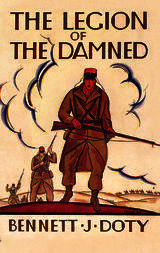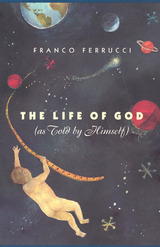2 books about Told by Himself

The Legion of the Damned
The Adventures of Bennett J. Doty in the French Foreign Legion as Told by Himself
Bennett J. Doty
Westholme Publishing, 2020
The Riveting Memoir of an American Volunteer in the French Foreign Legion during the 1925 Revolt in Syria
“You see there was down South a girl I liked. And she is now married . . . not to me.” So Bennett J. Doty confessed when he sailed for France and enlisted in the French Foreign Legion in 1924. A World War I veteran and University of Virginia student, Doty first trained in Morocco and Algeria before being shipped off to the French-controlled State of Syria. There, he and his fellow “bleus,” who hailed from Belgium, Poland, Italy, Senegal, Spain, Germany, Russia, and other countries, found themselves at the spearhead of the attempt to quell the revolt against French rule in the area. The fighting, mostly against the Druze, was fierce, merciless, and unrelenting. Fought in villages and at isolated outposts, there was no quarter. Entire villages were razed, fields destroyed, and prisoners were not taken by either side. In the engagement where Doty and several other of his “copains”—“buddies”—earned the Croix de Guerre, his unit became isolated and withstood days of attacks which claimed more than half of the Legionnaires until they were finally relieved by a French colonial column. With the immediate fighting over, the Legion was put to heavy manual labor under the hot desert sun. Doty became disillusioned, and with four other soldiers, fled in an attempt to reach British-controlled Jordan. They were caught, tried, and Doty was sentenced to eight years in a French prison. When word reached the United States, diplomatic efforts ultimately gained Doty a pardon and honorable discharge from service.
Originally published in 1928, Legion of the Damned, Doty’s acclaimed account of his time in the Legion, is a remarkable memoir that requires no additional drama to allow the reader to experience the desperation, exhilaration, fear, and disgust of a colonial war. Here, Doty shows how drunken, unruly, vicious veterans would transform into capable, cool, and orderly soldiers as soon as a battle began—the élan that earned the French Foreign Legion its reputation as a legendary fighting unit.
“You see there was down South a girl I liked. And she is now married . . . not to me.” So Bennett J. Doty confessed when he sailed for France and enlisted in the French Foreign Legion in 1924. A World War I veteran and University of Virginia student, Doty first trained in Morocco and Algeria before being shipped off to the French-controlled State of Syria. There, he and his fellow “bleus,” who hailed from Belgium, Poland, Italy, Senegal, Spain, Germany, Russia, and other countries, found themselves at the spearhead of the attempt to quell the revolt against French rule in the area. The fighting, mostly against the Druze, was fierce, merciless, and unrelenting. Fought in villages and at isolated outposts, there was no quarter. Entire villages were razed, fields destroyed, and prisoners were not taken by either side. In the engagement where Doty and several other of his “copains”—“buddies”—earned the Croix de Guerre, his unit became isolated and withstood days of attacks which claimed more than half of the Legionnaires until they were finally relieved by a French colonial column. With the immediate fighting over, the Legion was put to heavy manual labor under the hot desert sun. Doty became disillusioned, and with four other soldiers, fled in an attempt to reach British-controlled Jordan. They were caught, tried, and Doty was sentenced to eight years in a French prison. When word reached the United States, diplomatic efforts ultimately gained Doty a pardon and honorable discharge from service.
Originally published in 1928, Legion of the Damned, Doty’s acclaimed account of his time in the Legion, is a remarkable memoir that requires no additional drama to allow the reader to experience the desperation, exhilaration, fear, and disgust of a colonial war. Here, Doty shows how drunken, unruly, vicious veterans would transform into capable, cool, and orderly soldiers as soon as a battle began—the élan that earned the French Foreign Legion its reputation as a legendary fighting unit.
[more]

The Life of God (as Told by Himself)
Franco Ferrucci
University of Chicago Press, 1996
At the center of Franco Ferrucci's inspired novel is a tender, troubled God. In the beginning is God's solitude, and because God is lonely he creates the world. He falls in love with earth, plunges into the oceans, lives as plant and reptile and bird. His every thought and mood serve to populate the planet, with consequences that run away from him—sometimes delightfully, sometimes unfortunately.
When a new arrival emerges from the apes, God believes he has finally found the companion he needs to help him make sense of his unruly creation. Yet, as the centuries pass, God feels more and more out of place in the world he has created; by the close of his memoir, he is packing his bags.
Highly praised and widely reviewed, The Life of God is a playful, wondrous, and irresistible book, recounting thousands of years of religious and philosophical thought.
"A supreme but imperfect entity, the protagonist of this religiously enlightened and orthodoxically heretical novel is possessed by a raving love for his skewed, unbalanced world. . . . Blessed are the readers, for this tale of God's long insomnia will keep them happily awake. . . . Extraordinary." —Umberto Eco
"The Life of God is, in truth, the synthesis of a charming writer's . . . expression of his boundless hopes for, and poignant disappointments in, his own human kind." —Jack Miles, New York Times Book Review
"Rather endearing. . . . This exceedingly amusing novel . . . is a continuous provocation and delight; there isn't a dull page in it." —Kirkus Reviews
"A smart and charming knitting of secular and ecclesiastic views of the world. . . . The character of God is likable—sweet, utterly human. . . . The prose is delightful . . . the writing is consistently witty and intelligent and periodically hilarious." —Allison Stark Draper, Boston Review
"'God's only excuse is that he does not exist,' wrote Stendhal, but now Franco Ferrucci has provided the Supreme Being with another sort of alibi." —James Morrow, Washington Post Book World
When a new arrival emerges from the apes, God believes he has finally found the companion he needs to help him make sense of his unruly creation. Yet, as the centuries pass, God feels more and more out of place in the world he has created; by the close of his memoir, he is packing his bags.
Highly praised and widely reviewed, The Life of God is a playful, wondrous, and irresistible book, recounting thousands of years of religious and philosophical thought.
"A supreme but imperfect entity, the protagonist of this religiously enlightened and orthodoxically heretical novel is possessed by a raving love for his skewed, unbalanced world. . . . Blessed are the readers, for this tale of God's long insomnia will keep them happily awake. . . . Extraordinary." —Umberto Eco
"The Life of God is, in truth, the synthesis of a charming writer's . . . expression of his boundless hopes for, and poignant disappointments in, his own human kind." —Jack Miles, New York Times Book Review
"Rather endearing. . . . This exceedingly amusing novel . . . is a continuous provocation and delight; there isn't a dull page in it." —Kirkus Reviews
"A smart and charming knitting of secular and ecclesiastic views of the world. . . . The character of God is likable—sweet, utterly human. . . . The prose is delightful . . . the writing is consistently witty and intelligent and periodically hilarious." —Allison Stark Draper, Boston Review
"'God's only excuse is that he does not exist,' wrote Stendhal, but now Franco Ferrucci has provided the Supreme Being with another sort of alibi." —James Morrow, Washington Post Book World
[more]
READERS
Browse our collection.
PUBLISHERS
See BiblioVault's publisher services.
STUDENT SERVICES
Files for college accessibility offices.
UChicago Accessibility Resources
home | accessibility | search | about | contact us
BiblioVault ® 2001 - 2024
The University of Chicago Press









